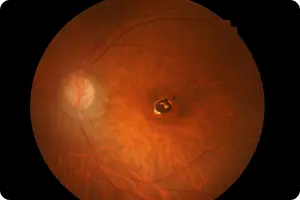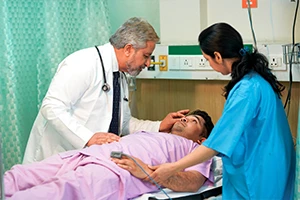


About

The retina is a delicate layer of tissue at the back of your eye, responsible for capturing light and sending visual signals to your brain. It plays a vital role in how we perceive the world. When affected by conditions like diabetic or hypertensive retinopathy, even slight damage can lead to serious vision loss. Early detection and expert care are crucial to preserving and restoring sight.
Symptoms
-
Diabetic Retinopathy
A diabetes-related condition where high blood sugar damages the tiny blood vessels in the retina, leading to vision loss if left untreated. -
Hypertensive Retinopathy
Caused by high blood pressure, this condition leads to damage in the retinal blood vessels, affecting visual clarity over time. -
Retinal Detachment
Occurs when the retina pulls away from its normal position, often causing sudden flashes, floaters or a shadow over the visual field. -
Macular Hole
A small break in the central part of the retina (macula) can cause blurred and distorted central vision. -
Macular Edema
Swelling or thickening of the macula due to fluid build-up, often leading to blurry or wavy central vision. -
Retinopathy of Prematurity (ROP)
A condition affecting premature babies where abnormal blood vessels grow in the retina, potentially leading to serious vision problems or blindness if untreated.
Treatments
Focused Treatments for Life’s
Sharpest Views
-
Personalised Treatment Plans
From medication to surgery, each treatment is customised to your specific retinal condition and lifestyle. -
Minimally Invasive Surgical Techniques
Advanced procedures like vitrectomy and retinal laser surgery ensure quicker recovery and optimal outcomes. -
Injections & Laser Therapy
Intravitreal injections and retinal lasers to manage diabetic retinopathy, macular edema, and more. -
Ongoing Monitoring & Support
Regular follow-ups and retinal scans to ensure your eyes stay on the path to recovery. -
Collaborative Care
Our retina specialists work closely with diabetologists and general physicians for holistic care when needed.
Why Choose Maxivision?
Your Eyes Deserve Experts
Testimonial
My overall experience at the hospital was very good. It is one of the best eye hospitals I have come across. From the doctors to other staff, everyone is truly supportive and very responsive to your concerns. Will highly recommend it.
I recently visited Max Vision Eye Hospital for an eye check-up. The doctor explained everything in a friendly way, and the staff were welcoming, providing clear guidance regarding my vision and necessary precautions.
The doctor was excellent and humble in handling my case, explained everything clearly, removed my fear, and performed the surgery smoothly.
I have visited Maxivision Super Speciality Eye Hospital and had a good experience there. The behavior of doctors and all other staff, including the receptionist, was really good and impressive.
Excellent service. Excellent care. The surgery went very smoothly. Even the insurance was processed very fast. So happy with the treatment for my dad. Thank you, Maxivision.
Maxivision provides personalized care, and detailed medical procedures are explained by qualified ophthalmologists and senior doctors. The outcome of my LASIK PRK surgery was good, and I now have clear vision.
Faq’s?
If one eye is affected by diabetic retinopathy, will the other be automatically affected?
Diabetic retinopathy usually affects both eyes. Symptoms may appear in one eye only, but both eyes are usually affected, though not necessarily equally.
What is the prevention of hypertensive retinopathy?
Control of high blood pressure prevents changes in the eye’s blood vessels.
What are the Causes of hypertensive retinopathy?
High blood pressure can cause damage to blood vessels in the eyes. The higher the blood pressure and the longer it has been high, the more severe the damage is likely to be. Your doctor can see narrowing of blood vessels and excess fluid oozing from blood vessels, with an instrument called an ophthalmoscope. The degree of retina damage (retinopathy) is graded on a scale of I to IV. At grade I, no symptoms may be present. Grade IV hypertensive retinopathy includes swelling of the visual centre of the retina (macula). Such swelling can cause decreased vision.
What injuries typically cause retinal detachments?
Bottle rockets, BB guns, racquetball, tennis, golf, soccer, boxing, and diving injuries can lead to retinal detachment.
Will my child have lasting vision problems?
Premature infants are already more likely to have vision problems. Things like nearsightedness, crossed eyes, and glaucoma show up more often and earlier in children born prematurely. Regular eye exams can help catch these issues quickly.
Can Lowering Blood Sugar Level Help With Diabetic Retinopathy?
When blood sugar levels are consistently high, the chances of diabetic retinopathy developing are high. That is why it is important to control your blood sugar levels to slow down diabetic retinopathy and prevent vision loss
Are macular holes hereditary?
Macular holes are typically not hereditary but are more common in older adults or those with certain eye conditions like myopia.
Who is at risk for developing macular holes?
Macular holes are more commonly found in people over the age of 60, and the risk increases with age. Other risk factors include being female, having a family history of macular holes, and having certain conditions such as nearsightedness, diabetic retinopathy, or a history of eye trauma or inflammation.
What causes macular edema?
Macular edema happens when blood vessels leak into a part of the retina called the macula. This makes the macula swell, causing blurry vision.
Many different conditions can cause macular edema. The most common one is diabetic retinopathy — an eye condition that causes vision loss in people with diabetes. When diabetic retinopathy causes macular edema, it’s called diabetic macular edema (DME).
If you have diabetic retinopathy, managing your diabetes can help prevent or delay vision loss. It’s also important to get a dilated eye exam at least once a year.
How common is ROP?
ROP affects over 3.5% of all premature births, as over 14,000 cases are diagnosed annually in the USA.
Approximately 3.9 million infants are born in the U.S. each year, with about 28,000 weighing in at 2¾ pounds or less at birth, but thanks to advances in neonatal care, not all premature infants develop ROP.
About 90% of all infants with ROP have a mild case, requiring no treatment at all, as it generally resolves on its own.
Your Eye Care Matters:
Book Your Appointment Now!





 Chat with us
Chat with us